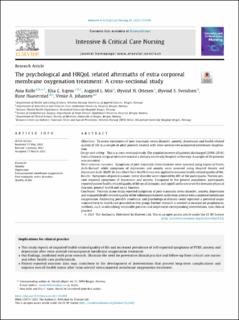| dc.contributor.author | Kolle, Aina | |
| dc.contributor.author | Irgens, Elsa C. | |
| dc.contributor.author | Moi, Asgjerd Litleré | |
| dc.contributor.author | Ottesen, Øyvind Heen | |
| dc.contributor.author | Svendsen, Øyvind Sverre | |
| dc.contributor.author | Haaverstad, Rune | |
| dc.contributor.author | Johansen, Venke A | |
| dc.date.accessioned | 2021-10-14T08:37:55Z | |
| dc.date.available | 2021-10-14T08:37:55Z | |
| dc.date.created | 2021-04-26T14:44:39Z | |
| dc.date.issued | 2021 | |
| dc.identifier.citation | Kolle, A., Irgens, E. C., Moi, A. L., Ottesen, Ø. H., Svendsen, Ø. S., Haaverstad, R., & Johansen, V. A. (2021). The psychological and HRQoL related aftermaths of extra corporeal membrane oxygenation treatment: A cross‐sectional study. Intensive and Critical Care Nursing, 65. | en_US |
| dc.identifier.issn | 0964-3397 | |
| dc.identifier.uri | https://hdl.handle.net/11250/2811808 | |
| dc.description.abstract | Objectives
To assess symptoms of post-traumatic stress disorder, anxiety, depression and health related quality of life in a sample of adult patients treated with veno-arterial extracorporeal membrane oxygenation.
Design and setting
This is a cross-sectional study. The population were all patients discharged (2008–2018) from a thoracic surgical intensive ward at a tertiary university hospital in Norway. A sample of 20 patients was recruited.
Main outcome measures
Symptoms of post-traumatic stress disorder were assessed using Impact of Events Scale-Revised, while symptoms of depression and anxiety were assessed using Hospital Anxiety and Depression Scale. RAND 36-Item Short Form Health Survey was applied to measure health-related quality of life.
Results
Symptoms of post-traumatic stress disorder were reported by 40% of the participants. Twenty percent reported symptoms of depression and anxiety. Compared to the general population, participants reported poorer health-related quality of life on all domains, and significantly worse on the domains physical function, general health and social function.
Conclusion
Patients in our study reported symptoms of post-traumatic stress disorder, anxiety, depression and impaired health-related quality of life following treatment with veno-arterial extra corporeal membrane oxygenation. Addressing possible emotional and psychological distress could represent a potential major improvement in health care provided to this group. Further research is needed to incorporate prophylactic methods, such as identifying vulnerable patients and implement corresponding interventions, into clinical practice. | en_US |
| dc.language.iso | eng | en_US |
| dc.publisher | Elsevier | en_US |
| dc.rights | Navngivelse 4.0 Internasjonal | * |
| dc.rights.uri | http://creativecommons.org/licenses/by/4.0/deed.no | * |
| dc.subject | anxiety | en_US |
| dc.subject | depression | en_US |
| dc.subject | extracorporeal membrane oxygenation | en_US |
| dc.subject | post-traumatic stress disorders | en_US |
| dc.subject | quality of life | en_US |
| dc.title | The Psychological and HRQoL related Aftermaths of Extra Corporeal Membrane Oxygenation Treatment: A Cross‐Sectional Study | en_US |
| dc.type | Peer reviewed | en_US |
| dc.type | Journal article | en_US |
| dc.description.version | publishedVersion | en_US |
| dc.rights.holder | © 2021 The Authors | en_US |
| dc.source.volume | 65 | en_US |
| dc.source.journal | Intensive & Critical Care Nursing | en_US |
| dc.identifier.doi | 10.1016/j.iccn.2021.103058 | |
| dc.identifier.cristin | 1906459 | |
| cristin.ispublished | true | |
| cristin.fulltext | original | |
| cristin.qualitycode | 1 | |

